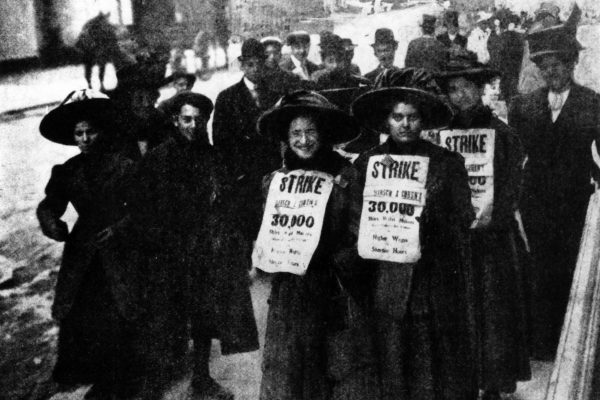March is Women’s History Month, and this Wednesday, March 8, is International Women’s Day, a holiday that originated in the socialist and women’s suffrage movements of the early twentieth century. To celebrate we devote this week’s reading list to women’s struggle for freedom and equality.
Movements for gender equality and economic rights are often intertwined, as journalist Judith Levine observes in an essay about the history of workplace sexual harassment. “Sexual harassment happens to women (and sexual and gender minorities) at work,” Levine writes. “It is intersectional, a case of economic and gender oppression.” Despite their far from perfect record on such issues, unions have historically played a key role in redressing the workplace power imbalances that feed harassment. In the era of #MeToo, their importance in securing women’s rights must be recognized, Levine concludes.
Meanwhile, for critical Black studies scholar Charisse Burden-Stelly and political theorist Jodi Dean, the history of Black communist women offers vital lessons for today’s organizers. “Black communist women in the first half of the twentieth century foregrounded how capitalism incites racism and sexism to fragment workers and maintain class power,” they write. Rather than seeking to downplay sexism in the name of class struggle, they argue, advocates for a more just economy should highlight its role in maintaining inequality.
Other essays on this week’s list address an array of related issues, including women’s domestic labor and care work, the future of reproductive justice, the continuing fight to pass the Equal Rights Amendment, and women’s political representation. In addition, a dispatch from Ukraine describes the relationship between post-Soviet gender studies and the Russian invasion, a political scientist examines women’s protest in Iran, and several essays profile preeminent advocates of women’s liberation, including Barbara Ehrenreich, Ellen Willis, and Simone de Beauvoir.
And what today’s organizers can learn from them.
Silvia Federici interviewed by Jill Richards.
Renewed efforts to quash it stand to wipe out a hundred years of women’s work as constitution-makers.
Recent works depict the agonies and rage of being a low-wage housekeeper or nanny. But all fail to identify capitalism itself as the culprit.
Feminism and trans* activism have been at odds for decades. They don't need to be.
From street demonstrations to song, dance, film, and poetry, women are advancing a long legacy of struggle against authoritarianism in Iran.
The late author of Nickel and Dimed played a major role in women’s liberation and U.S. socialism.
It is time to stop talking about Roe as the touchstone for abortion rights and to start imagining what law and policy can do to facilitate affordable and available services.
Freedom means a world where how I parent is simply mundane rather than overburdened with meaning.
On the importance of women’s studies after the USSR collapsed, and what it helps us understand about Putin’s war on Ukraine.
Black women go missing—from civil rights history and from our lives.
To fight sexual harassment in the workplace, we must return to the history of women in the labor movement.
Forum
If women’s suffrage was the battle of the twentieth century, women’s representation will be the battle of the twenty-first.
The romantic obsessions of Colette, Simone de Beauvoir, and Marguerite Duras.
On the feminist essayist, journalist, and music critic who championed women’s liberation.




















